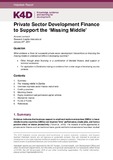| dc.contributor.author | Lenhardt, Amanda | |
| dc.coverage.spatial | Zambia | en |
| dc.date.accessioned | 2021-08-31T14:15:00Z | |
| dc.date.available | 2021-08-31T14:15:00Z | |
| dc.date.issued | 2021-01-20 | |
| dc.identifier.citation | Lenhardt, A. (2021). Private Sector Development Finance to Support the ‘Missing Middle’. K4D Helpdesk Report. Brighton, UK: Institute of Development Studies. DOI: 10.19088/K4D.2021.106 | en |
| dc.identifier.uri | https://opendocs.ids.ac.uk/opendocs/handle/20.500.12413/16819 | |
| dc.description.abstract | Evidence indicates that business support to small and medium enterprises (SMEs) in lower middle-income countries (LMICs) can improve firms’ performance, create jobs, and have a positive effect on labour productivity (Piza et al., 2016). The impacts of some approaches to private sector finance such as traditional loans, grants and technical assistance have been studied empirically, but there is limited evidence of the impacts of non-traditional and innovative financing instruments (Mallen & Bungey, 2019; Piza et al., 2016). Studies of financial instruments to support SMEs in LICs and LMICs tend to focus on particular markets or adaptations to traditional funding models rather than targeted outcomes such as sustainable employment creation (Mallen & Bungey, 2019). This report explores evidence on the effectiveness of financing options available to bilateral donors to promote private sector development (PSD) in LIMCs, however the evidence base for most financing instruments is extremely limited and much of the evidence is more than 5 years old. The report seeks to provide a (non-comprehensive) list of available Overseas Development Assistance (ODA) eligible options and a more detailed examination of those options for which evidence was identified for this review. An open search for evidence on PSD interventions to support SMEs in LMICs and LICs was carried out, followed by a targeted search of interventions seeking to support medium-sized enterprises (the ‘missing middle’) in Zambia specifically. The report begins with a brief overview of the ‘missing middle’ challenge in Zambia. Section 3 explores recent trends in bilateral finance for PSD. The remaining sections of the report explore available evidence on the effectiveness of specific interventions: credit guarantees, matching grants, equity investment and permanent capital vehicles, mezzanine finance, and funds of funds. | en |
| dc.description.sponsorship | Foreign, Commonwealth & Development Office (FCDO) | en |
| dc.language.iso | en | en |
| dc.publisher | Institute of Development Studies | en |
| dc.relation.ispartofseries | K4D Helpdesk Report;965 | |
| dc.rights.uri | https://www.nationalarchives.gov.uk/doc/open-government-licence/version/3/ | en |
| dc.subject | Finance | en |
| dc.title | Private Sector Development Finance to Support the ‘Missing Middle’ | en |
| dc.type | Helpdesk | en |
| dc.rights.holder | © Crown copyright 2021 | en |
| dc.identifier.doi | 10.19088/K4D.2021.106 | |
| dcterms.dateAccepted | 2021-01-20 | |
| rioxxterms.funder | Default funder | en |
| rioxxterms.identifier.project | Default project | en |
| rioxxterms.version | VoR | en |
| rioxxterms.versionofrecord | 10.19088/K4D.2021.106 | en |
| rioxxterms.funder.project | 9ce4e4dc-26e9-4d78-96e9-15e4dcac0642 | en |

